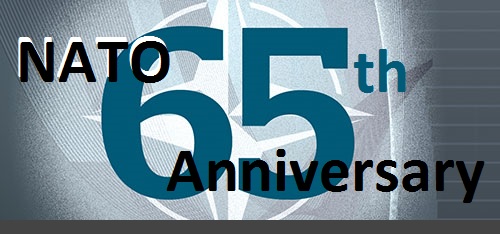 Not so long ago, many commentators were questioning whether NATO still had a role to play in today’s world. The security challenges of today and tomorrow, the argument ran, were not in the Alliance’s region but elsewhere, in Africa or in South and East Asia. Collective security, therefore, was no longer needed in Europe.
Not so long ago, many commentators were questioning whether NATO still had a role to play in today’s world. The security challenges of today and tomorrow, the argument ran, were not in the Alliance’s region but elsewhere, in Africa or in South and East Asia. Collective security, therefore, was no longer needed in Europe.
But last week, when NATO reached its sixty-fifth birthday, there were few, if any, attempts to liken the organization to an old-age pensioner, fit for Social Security checks and a graceful retirement. Instead, Russia’s illegal annexation of Crimea—and now its thuggish menacing of eastern Ukraine—has served as a reminder of why, in the second decade of the twenty-first century, we still need strong transatlantic collective security.
In response to this challenge, we must reaffirm our existing commitments. Last month, President Obama pointed to the critical importance of NATO’s collective defence guarantee, and the need to “make sure that every member of NATO feels confident in Article 5’s effect.” We must continue with day-to-day operations and exercises essential to reassuring our allies that we mean what Article 5 says. Nor have we shrunk from imposing sanctions on Russia in support of our partners beyond NATO—especially those whose territory was historically occupied by the Soviet Union.
In Afghanistan, NATO’s largest mission to date has helped bring about a situation whereby millions of Afghans can, in relative safety, vote in their country’s first democratic transfer of power in decades. The fact that only three percent of polling stations had to close for security reasons shows how far Afghanistan has come. And it is a testament to the unifying power of NATO that this year, after almost thirteen years of tough operations, our combat forces, having fought together, will draw down together, ‘as NATO.’ The Alliance will continue to play an indispensible role in Afghanistan, training local forces to meet the security challenges they face.
Common defence is not just essential to our security; it also makes economic sense. On both sides of the Atlantic, defence budgets have of necessity been squeezed. We can share the burden of security by working together and playing to each other’s strengths. Secretary Hagel has repeatedly called for this (most recently in the Pentagon’s Quadrennial Defense Review) under the banner of the United States’ emphasis on allies and partners. NATO members routinely plan, operate and train together – air policing in the Baltic is a good example. We should think creatively about how we can do more.
Ukraine, Afghanistan and defense cooperation will all, it is safe to say, be on the agenda when NATO Heads of Government meet in South Wales in September for the Alliance’s sixty-fifth anniversary Summit. In several respects, the Summit will mark a new chapter in NATO’s history. Its longest and largest operation is nearing its end. For the first time since 2001, NATO troops will no longer be fighting together, although they will of course continue to train together.
Yet the overall threat we face has not diminished; in fact, it is growing in complexity and geographic diversity. To meet it, we will need a similarly nuanced response. That should include not only investing in the full range of cutting-edge military capabilities, but also helping to stabilize vulnerable countries outside our region before they become active threats to our own security. At the same time, events in Ukraine show the enduring importance of NATO’s original, core mission of collective security. I am proud that my country is to host this Summit at such a pivotal moment in the history of the Alliance that has kept us secure for sixty-five years and counting.
Sir Peter Westmacott is the United Kingdom’s ambassador to the United States.
Image: NATO was founded in 1949 (graphic: US Mission to NATO)
